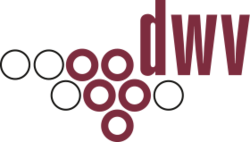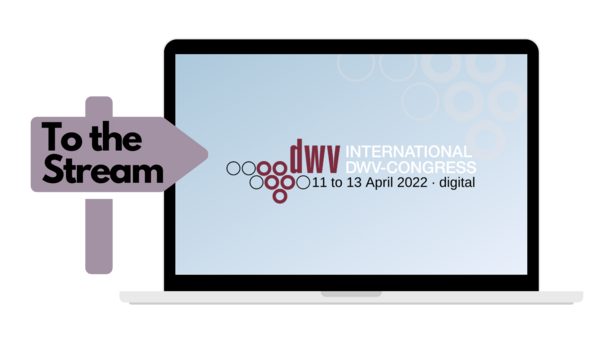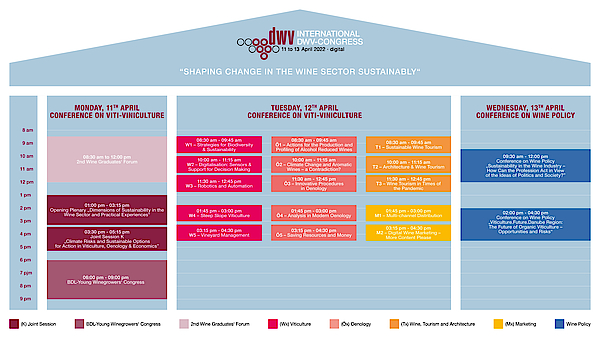12.04.2022: Conference on Viti-Viniculture (session on substainability)
Click on the image to access the streams of the digital 64th International DWV-Congress.
Please have your access code ready.
This can be found on your ticket (PDF), which you received from us by email.
It is a personalised 14-digit code.
Five rounds of parallel sessions - you choose (or switch flexibly!)
Your day ticket (€ 39.00) or the combination ticket (€ 49.00) entitles you to a flexible participation in all sessions.
1st section of sessions (08:30-09:45)
W1 Strategies for Biodiversity & Sustainability
| Subject Sustainability - Viticulture | |
| Date 12-04-22 | Time 08:30 a.m. - 09:45 a.m |
Moderator: Dr. Johanna Döring, Hochschule Geisenheim University
Embankment greening in terraced vineyards for biodiversity and protection against erosion Prof. Dr. Ilona Leyer, Hochschule Geisenheim University
Biodiversity in steep slope vineyards – ecological advantages of terracing Dr. Michael Maixner, Julius Kühn-Institut
Grapevine cultivars adapted towards Climate change Prof. Dr. Astrid Forneck, Universität für Bodenkultur Wien, Austria
The importance of environmental stewardship, carbon sequestration, energy efficiency and the business benefits of sustainability Stephanie L. Bolton PhD, Lodi Winegrape Commission, USA Instead of trying to face agricultural and business challenges and communicate with buyers individually, winegrowers can find value in joining a farmer-based regional certification program to help address these mounting challenges as a community. One example of this collaborative approach to facing challenges is the international LODI RULES sustainable winegrowing certification program, which offers farmers a science-based, holistic business plan for agriculture in a way that is environmentally and socially responsible. LODI RULES was created with extensive farmer input and covers business, human resources, soil, water, ecosystem, and pest management. The program is effective because it is based on sound science, is written in simple language, contains economically feasible practices that are measurable, has flexibility, and because people find value in it. Farmers learn tools for resilient agriculture through participation and likewise, the program itself evolves to meet emerging environmental, social, and business challenges.
The importance of sustainability in German food retailing Prof. Dr. Carolyn Hutter, Duale Hochschule Baden-Württemberg Heilbronn Supply chain transparency, climate protection, biodiversity and many more – food retailers have significantly increased their CSR initiatives over the past years – What is the overall importance of sustainability in food retailing and what are the strategic priorities? |
|
| Registration | |
Ö1 Actions for the Production and Profiling of Alcohol Reduced Wines
| Subject Sustainability - Oenology | |
| Date 12-04-22 | Time 08:30 a.m. - 09:45 a.m. |
Moderator: Prof. Dr. Monika Christmann, Hochschule Geisenheim University and Jörg Weiand, Dienstleistungszentrum Ländlicher Raum (DLR) Rheinhessen-Nahe-Hunsrück
Legal aspects and trends for wines with reduced alcohol Prof. Dr. Monika Christmann, Hochschule Geisenheim University
Matching Winemaking to consumer expectations? Dr. Cornelia Klug, Duale Hochschule Baden-Württemberg Heilbronn
Production of alcohol reduced wines from a technical and sensorial perspective Dr. Matthias Schmitt, Hochschule Geisenheim University; Simon Bachmann, Staatliche Lehr- und Versuchsanstalt für Wein- und Obstbau Weinsberg; Dipl.-Ing. Johannes Burkert, Bayerische Landesanstalt für Weinbau und Gartenbau; Achim Rosch, Dienstleistungszentrum Ländlicher Raum (DLR) Mosel |
|
The market for alcohol reduced and alcohol free wines is steadily growing on a global scale. Climate change, new demand in consumer expectations etc. are supporting this trend. In this session important facts and questions for the producers will be raised and discussed. The legal aspects are of great importance. What is the difference between an “alcohol free wine” and an “alcohol reduced wine”? Where are the limits? Experts from different wine growing regions will answer to the questions of:
|
|
| Registration | |
T1 Sustainable Wine Tourism
| Subject Sustainability - Wine, Tourism and Architecture | |
| Date 12-04-22 | Time 08:30 a.m. - 09:45 a.m. |
Moderator: Prof. Dr. Gergely Szolnoki, Hochschule Geisenheim University
Biodiversity and tourism – how can wine tourism be made more sustainable? Martina von Münchhausen, WWF Deutschland
Sustainable Wine Tourism Practices Prof. Marianna Sigala, University of Piraeus, Greece
Implementation of the certification Sustainable Destination on the Deutsche Weinstrasse (German Wine Route) Nadine Schubert, Südliche Weinstraße e. V.
Best practice example – sustainable wine tourism Barbara Roth, Wein- und Sektgut Wilhelmshof |
|
Sustainable wine tourism is a complex, multidisciplinary and cross-sectoral concept that contributes significantly to the development of individual wineries and the whole wine region. This session will look at the basic principles of sustainability and tourism and discuss their specific aspects in wine tourism. |
|
| Registration | |
2nd section of sessions (10:00-11:15)
W2 Digitalisation: Sensors & Support for Decision Making
| Subject Sustainability - Viticulture | |
| Date 12-04-22 | Time 10:00 am to 11:15 am |
Moderator: Dr. Anna Kicherer, Julius Kühn-Institut and Ingolf Römer, Universität Leipzig
Development in remote sensing – digital solutions for the use in viticulture Christoph Schimmer, geo-konzept GmbH
Site-specific monitoring of water balance in vineyards – linking field sensor technology, simulation models and drone deployment Dr. Rikard Graß, Helmholtz-Zentrum für Umweltforschung GmbH – UFZ
LoRaWAN Netzworks in viticulture: what’s in it for vinegrowers? Dr. Matthias Friedel, Hochschule Geisenheim University
GeoBox-Messenger – A specialist application for governmental information in viticulture. Integration of innovative technologies for decision support Katharina Schelter and Daniel Eberz-Eder, Dienstleistungszentrum Ländlicher Raum (DLR) Rheinhessen-Nahe-Hunsrück |
|
Ö2 Climate change and aromatic wines – a contradiction?
| Subject Sustainability - Oenology | |
| Date 12-04-22 | Time 10:00 am to 11:15 am |
Moderator: Prof. Dr. Doris Rauhut, Hochschule Geisenheim University and Dr. Dieter Blankenhorn, Staatliche Lehr- und Versuchsanstalt für Wein- und Obstbau Weinsberg
Climate Change and quality wines – a contradiction? Prof. Vladimir Jiranek, University of Adelaide, Australia
Wine yeast terroir: the story is an old hat! Prof. Hervé Alexandre, Université de Bourgogne, Dijon, France
How to limit the climate-induced rise of the petrol off-flavor by viticultural and oenological measures Prof. Dr. Ulrich Fischer, Dienstleistungszentrum Ländlicher Raum (DLR) Rheinpfalz
Influence of wine bottling and storage conditions on Riesling varietal aromas: monoterpenes and C13-norisoprenoids Dr. Andrii Tarasov, Hochschule Geisenheim University |
|
T2 Architecture and Wine Tourism
| Subject Sustainability - Wine, Tourism and Architecture | |
| Date 12-04-22 | Time 10:00 am to 11:15 am |
Moderator: Annette Müller, Architektenkammer Rheinland-Pfalz and Georg Bätz, Bayerische Landesanstalt für Weinbau
Iconic architectures in the vineyards and their impact on wine tourism Catherine Leparmentier Dayot, Great Wine Capital Bordeaux, France
Architecture and wine tourism from the perspective of an international expert
Wine architecture: The breadth of possibilities. Current examples from the Wine Architecture Award 2022. Weinkelter Weingut Ellwanger in Winterbach Andreas Bloss, BK2H / Architekten Part mbB Weinmanufaktur Van Volxem in Wiltingen Johann Vonmetz, Architekturbüro arch.tv | Trojer Vonmetz Architekten, Italy |
|
3rd section of sessions (11:30-12:45)
W3 Robotics and Automation
| Subject Sustainability - Viticulture | |
| Date 12-04-22 | Time 11:30 am to 12:45 pm |
Moderator: Prof. Dr. Dimitrios S. Paraforos, Hochschule Geisenheim University and Dr. Philipp Rüger, Dienstleistungszentrum Ländlicher Raum (DLR) Rheinhessen-Nahe-Hunsrück
Robots and agriculture: Trends and future perspectives Prof. Dr. Hans W. Griepentrog, Universität Hohenheim
Robotics and smart implements in viticulture Dr. ir. Frits van Evert, Wageningen University & Research, Netherlands
How to bring intelligence to proven mobile machines Matthias Schächter, Robot Makers GmbH
Application in precision viticulture Prof. Dr. Spyros Fountas, Agricultural University of Athens, Greece |
|
Ö3 Innovative Procedures in Oenology
| Subject Sustainability - Oenology | |
| Date 12-04-22 | Time 11:30 am to 12:45 pm |
Moderator: Prof. Dr. Dominik Durner, Dienstleistungszentrum Ländlicher Raum (DLR) Rheinpfalz and Prof. Dr. Jürgen Wendland, Hochschule Geisenheim University
Dr. Simon Nordestgaard, The Australian Wine Research Institute, Australien
Adjustment of acidity and pH, improvement of tartrate stability: potential of cation exchange resins in winemaking Dr. Patrick Nickolaus, Dienstleistungszentrum Ländlicher Raum (DLR) Rheinpfalz
Innovative applications of non-conventional yeasts in the modulation of wine acidity University Professor Santiago Benito Sáez, Polytechnic University of Madrid, Spain |
|
T3 Wine Tourism in Times of the Pandemic
| Subject Sustainability - Wine, Tourism and Architecture | |
| Date 12-04-22 | Time 11:30 am to 12:45 pm |
Moderator: Vanessa Hauert, Staatliche Lehr- und Versuchsanstalt für Wein- und Obstbau Weinsberg and Prof. Dr. Gergely Szolnoki, Hochschule Geisenheim University
Tourism before, during and after the Covid 19-crisis Lars Bengsch, dwif-Consulting GmbH
Digital wine tourism strategies during the pandemic Andrea Wirsching, Weingut Hans Wirsching KG Zoltan Heimann, Weingut Heimann, Hungary Klaus Gasser, Kellerei Terlan, Italy (requested) Andreas Braun, Tourismus Marketing GmbH Baden-Württemberg |
|
4th section of sessions (13:45-15:00)
W4 Steep slope viticulture
| Subject Sustainability - Viticulture | |
| Date 12-04-22 | Time 01:45 pm to 03:00 pm |
Moderator: Dr. Matthias Porten, Dienstleistungszentrum Ländlicher Raum (DLR) Mosel
Steep slope viticulture in South Tyrol: Machine-friendly creation of new systems, management and cost analysis Hansjörg Hafner, Südtiroler Beratungsring für Obst- und Weinbau, Italy
Water budget and irrigation in steep slope vineyards Dipl.-Physiker Marco Hofmann, Hochschule Geisenheim University
Plant protection in steep slope viticulture with the drone - experiences in Switzerland Ueli Sager und Jens Adank, Remote Vision GmbH, Switzerland |
|
Ö4 Analytics in the service of modern oenology
| Subject Sustainability - Oenology | |
| Date 12-04-22 | Time 01:45 pm to 03:00 pm |
Moderator: Dr. Ramón Heidinger, Staatliches Weinbauinstitut Freiburg, and Achim Rosch, Dienstleistungszentrum Ländlicher Raum (DLR) Mosel
Measure the health of the grapes online Dr. Martin Pour Nikfardjam, Staatliche Lehr- und Versuchsanstalt für Wein- und Obstbau Weinsberg
Smartphone-based analysis systems in a practical test Prof. Dr. Maren Scharfenberger-Schmeer, Weincampus Neustadt und Dominik Süß, DLR Rheinhessen-Nahe-Hunsrück
Oenological tannins Prof. Dr. Fernando Zamora, Universitat Rovira i Virgili, Tarragona, Spanien
Reductive wine aromas Prof. Dr. Vicente Ferreira, Universidad Zaragoza, Spanien |
|
M1 Multi-channel distribution
| Subject Sustainability - Marketing | |
| Date 12-04-22 | Time 01:45 pm to 03:00 pm |
Moderator: Prof. Dr. Simone Loose, Hochschule Geisenheim University
How can a winery play successfully on many sales channels? Roman Niewodniczanski, Van Volxem
Through which channels will wine be marketed in the future? Marian Kopp, Lauffener Weingärtner eG
What does the structural change in the trade mean for the wineries? Markus Bonsels, Weingut Bibo Runge |
|
5th section of sessions (15:15-16:30)
W5 Vineyard Management
| Subject Sustainability - Viticulture | |
| Date 12-04-22 | Time 03:15 pm to 04:30 pm |
Moderator: Dr. Daniel Heßdörfer, Bayerische Landesanstalt für Weinbau und Gartenbau
Digital techniques as decision support in viticulture – where is this taking us? Dr. Anna Kicherer, Julius Kühn-Institut
Possibilities and limits of a documentation and operational management system Marcel Sambale-Lergenmüller, Vineyard Cloud GmbH
Smart irrigation – taking the right decisions at the right time Ziv Charitt und Yechiam Gets, Netafim, Israel
Irrigation systems for viticulture - How to achieve sustainable water supply? Dr. Daniel Heßdörfer, Bayerische Landesanstalt für Weinbau und Gartenbau |
|
Ö5 Saving Resources and Money
| Subject Sustainability - Oenology | |
| Date 12-04-22 | Time 03:15 pm to 04:30 pm |
Moderator: Prof. Dr. Rainer Jung, Hochschule Geisenheim University and Dipl.-Ing. Johannes Burkert, Bayerische Landesanstalt für Weinbau und Gartenbau
Energy management in wine production: from the analysis of energy sources to the CO2 footprint of wine Prof. Dr. Dominik Durner, Dienstleistungszentrum Ländlicher Raum (DLR) Rheinpfalz and Dr. Maximilian Freund, Hochschule Geisenheim University
Input of using returnable bottles to improve sustainability in the wine industry Meike Strobach, M. Sc., Hochschule Geisenheim University
5-1=6: the new, sustainable (cost) accounting Prof. Dr. Marc Dreßler, Weincampus Neustadt |
|
M2 Digital wine marketing - more content please!
| Subject Sustainability - Marketing | |
| Date 12-04-22 | Time 03:15 pm to 04:30 pm |
Moderator: Bernd Wechsler, Dienstleistungszentrum Ländlicher Raum (DLR) Rheinhessen-Nahe-Hunsrück and Prof. Dr. Simone Loose, Hochschule Geisenheim University
Customer journey – Content management without loss of control Prof. Dr. Daniel Deimling, Hochschule Heilbronn
Professional online marketing – stay authentic! Marco Göbel and Patrik Dockner, WINEWORLDS Weinmarketing
Social media marketing – just do it! Lisa Kechel, Expertin für digitales Marketing
Influencer marketing – the gini out of the bottle Georgia Panagopoulou – wine.gini, Greece |
|
Click here to download the programme (PDF).
With financial support of
- Ministerium für Ernährung, Ländlichen Raum und Verbraucherschutz Baden-Württemberg
- Ministerium für Wirtschaft, Verkehr, Landwirtschaft und Weinbau Rheinland-Pfalz
- Bayerisches Staatsministerium für Ernährung, Landwirtschaft und Forsten
- Hessisches Ministerium für Umwelt, Klimaschutz, Landwirtschaft und Verbraucherschutz
- Staatsministerium Baden-Württemberg (event „Viticulture.Future.Danube Region.")






